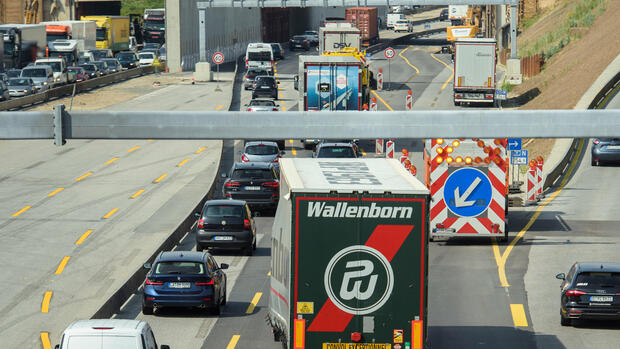In the future, the federal government wants to declare a number of motorway and rail projects to be of “outstanding public interest” and thus significantly accelerate them. But how much faster will it actually get? Do the projects reach the “Germany speed” declared by Chancellor Olaf Scholz (SPD), with which planning and approval procedures should only take half the time?
Seven Bavarian members of the CDU/CSU parliamentary group have asked the Federal Ministry of Transport. They wanted to know for their constituency “by how many years” faster the local motorway projects will be completed – and when exactly.
The ministry’s answer was always the same: “How much time is saved depends on the individual case and cannot be quantified in advance.” In principle, the projects covered by the regulation were given special weight, “so that the respective tests and decisions become easier and faster”.
The ministry also referred to the changed administrative court regulations, according to which the courts can give priority to important projects. But the same applies here: “Exact times for individual projects are not possible, as these still depend on the specific framework conditions of the projects.”
Criticism from the opposition of the traffic light procedure
Criticism from the opposition followed promptly: “With such a dubious and poorly crafted law, the traffic light is not getting any faster, it is hitting the wall,” said Union parliamentary group leader Ulrich Lange (CSU) to the Handelsblatt.
Nothing will change in the previous system. The “label” of outstanding public interest is an indefinite legal concept and therefore has no effect. “Legal priority for transport projects is therefore non-existent.”
>> Read here: Transport Minister Wissing wants to push ahead with major projects
Administrative lawyers like Christiane Kappes from CMS Hasche Sigle are also dampening hopes of faster procedures. It is true that the reference to the public interest helps when authorities weigh up the process and examine exceptions. “The acceleration potential is still limited,” said the expert, who has already accompanied major projects such as the Fehmarnbelt crossing or the construction of liquid gas terminals.
The requirements for the environmental studies are primarily decisive for the duration of a plan. And when looking for possible exceptions, the time-consuming alternative tests in particular cost time. Likewise, the statutory approval periods are now “a blunt sword”.
High content requirements for environmental law
After all, there are no consequences if an authority misses a deadline. And the high substantive requirements of environmental law would still have to be met. “If an approval decision issued to meet the deadline is then overturned by the administrative courts, nothing is gained,” warned Kappes.
The construction of liquid gas terminals is to be accelerated.
(Photo: IMAGO/blickwinkel)
This is probably one of the reasons why the draft provides that deadlines can be extended several times. “Especially in the case of complex large-scale projects in environmentally sensitive areas, use will have to be made of this”, reported Kappes from experience.
Criticism of the legislative plans also comes from a completely different direction: from the bargemen. They complain that waterways should not be given preferential treatment like roads and rails. So far, the law only provides that certain projects should in future be discussed directly in front of the Federal Administrative Court in order to shorten the legal process.
Further delays are imminent
Changes are still possible in the parliamentary procedure, in which the federal states must also agree. But there could already be another delay: the Union faction threatens that the countries could reject the law and start a mediation process.
“The federal states must be aware of their limited ability to influence the determination of the acceleration projects if they allowed this law to pass without appealing to the mediation committee,” said parliamentary group leader Lange.
And there is another brake: the budget politicians from the SPD, Greens and FDP want to decide on Wednesday that the Ministry of transport projects will have to check their profitability every five years in the future.
They are reacting to a report by the Federal Court of Auditors, which criticized the previous monitoring as insufficient and called for every project to be checked regularly. The budget politician of the left, Victor Perli, explained that it was “an absurdity that the ministry takes so much time and does not examine individual projects for their benefit-cost ratio”.
More: “Almost a step joke” – Scholz disappoints the prime ministers in the planning process
